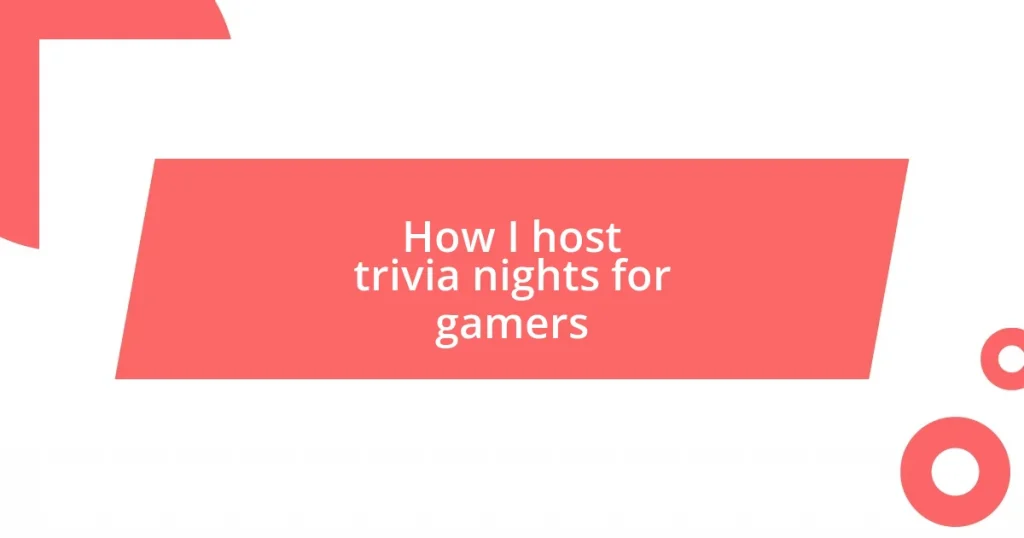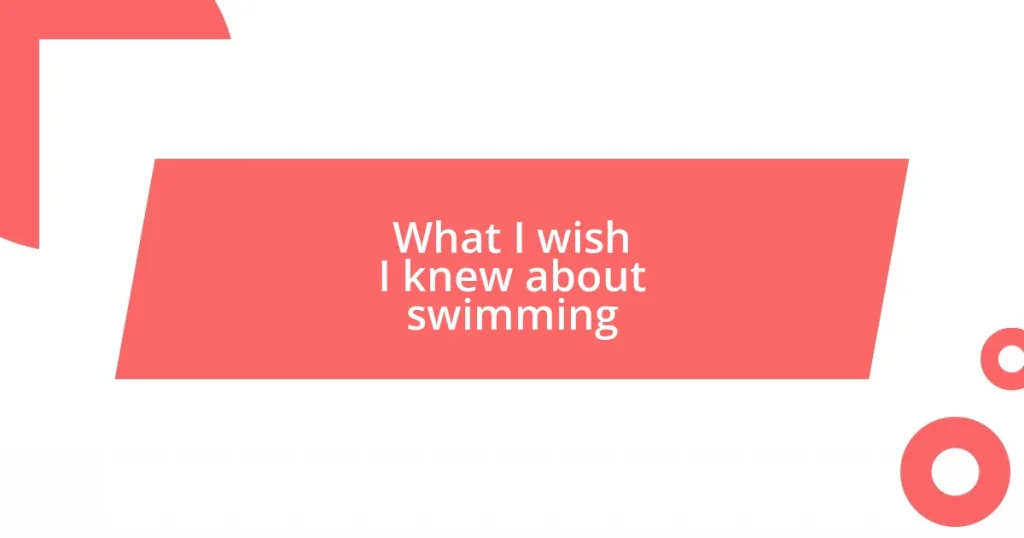Key takeaways:
- Choose trivia formats and themes that resonate with your audience, such as retro video games or popular franchises, to foster connection and engagement.
- Create trivia questions that balance challenge and fun, encourage discussion, and include relatable content to enhance the experience.
- Gather feedback regularly to improve your events, embracing participant suggestions and constructive criticism to create more enjoyable trivia nights.
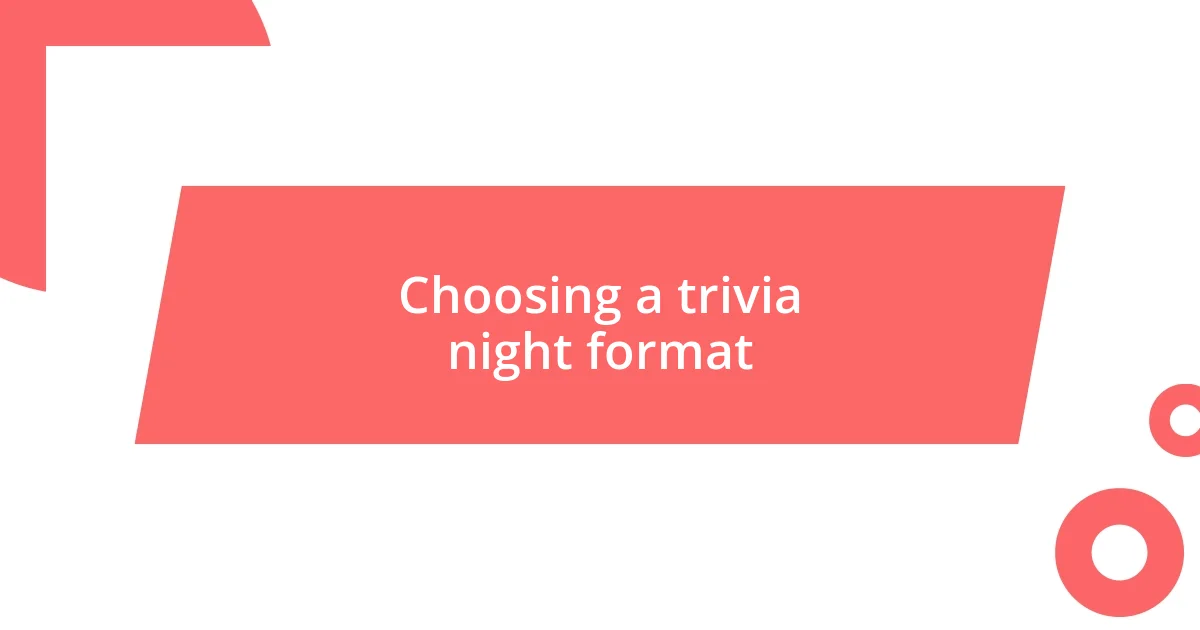
Choosing a trivia night format
When choosing a trivia night format, it’s essential to think about your audience. I remember my first trivia night, where I opted for a standard multiple-choice format. While it was straightforward, many players found it too easy, and I knew I needed to ramp up the challenge on my next go-around.
Another approach I’ve enjoyed is themed trivia, which often brings everyone together over shared interests. One time, I ran a night focused entirely on retro video games, complete with soundtracks and classic visuals. Seeing the nostalgia spark in my friends’ eyes as they recognized their childhood favorites was incredibly rewarding. It makes you wonder: Can a trivia format really create that kind of connection?
Finally, keep in mind the pacing and flow of the event. After a few trivia nights, I learned that spontaneity can lead to unforgettable moments. I once introduced a rapid-fire round just for fun, and the excitement it generated was palpable, reminding me that flexibility often leads to the best experiences.

Selecting gamer-friendly topics
Selecting gamer-friendly topics can make or break your trivia night. I’ve noticed that the best themes resonate not just with their gaming knowledge but also with their passions. For instance, when I curated a trivia round centered around beloved indie games, it transformed the atmosphere. Everyone started to recall their favorite moments, sparking discussions that went well beyond just answering questions.
In exploring various genres, I’ve learned that tapping into popular franchises is always a hit. On one occasion, I held a round dedicated to the “Legend of Zelda” series. The room buzzed with excitement, and players eagerly anticipated each question, sharing laughter and playful debate over character trivia. This connection makes the event feel more like a celebration rather than just a competition.
Using diverse topics enhances the experience too. From exploring game soundtracks to in-depth questions about game development stories, mixing it up keeps everyone engaged. I remember including an unexpected round on game history once, and to my surprise, the gamers loved showcasing their nerdy trivia knowledge. It’s those moments of shared discovery that breathe life into your trivia night.
| Gaming Genre | Topic Examples |
|---|---|
| Action/Adventure | Legend of Zelda, Uncharted |
| Indie Games | Celeste, Hollow Knight |
| Game Development | Behind the scenes, Developer stories |
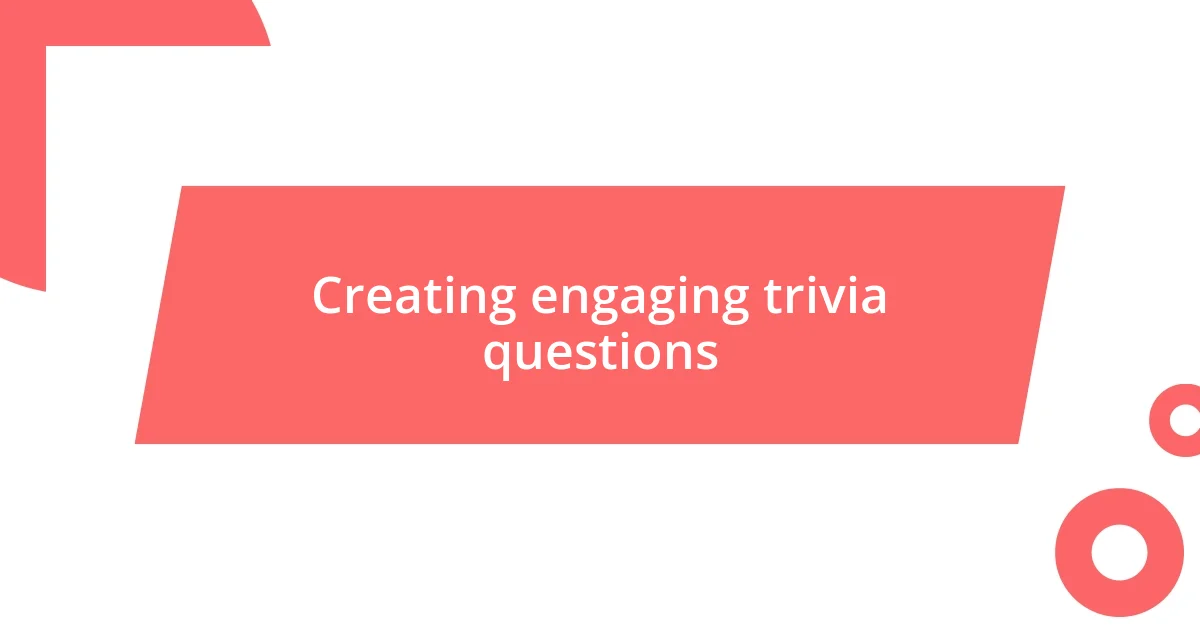
Creating engaging trivia questions
Creating trivia questions that truly engage your audience is like crafting the perfect game level—there’s a fine balance between challenge and fun. I always try to balance difficulty, ensuring that questions range from accessible to more tough nut to crack. Once, I crafted a round with a mix of easy and trickier questions about iconic gaming characters, which sparked a lively debate among players. Watching them passionately defend their answers and bond over shared experiences reminded me just how powerful gaming nostalgia can be.
When designing your questions, consider these essential points:
- Variety in Question Types: Mix up multiple-choice, direct questions, and visual prompts. For instance, a “guess the character from their silhouette” can add a fun twist.
- Relatable Content: Use questions that resonate with players’ experiences. Everyone loves recalling the first time they defeated a challenging boss!
- Include Personal Touches: Share your own stories related to certain games, making the questions feel more personal and inviting.
- Encourage Discussion: Craft questions that lead to retelling experiences, like “What was your favorite weapon in ‘Halo’?” This not only generates answers but also sparks conversations.
I find that when trivia questions are crafted with care, incorporating humor and references that resonate, the entire room feels energized. I crafted a question about infamous gaming glitches once, and the laughter erupted as people shared their own glitch stories, turning a simple trivia game into an unforgettable storytelling session. Emphasizing connection through questions makes the experience enjoyable and memorable.
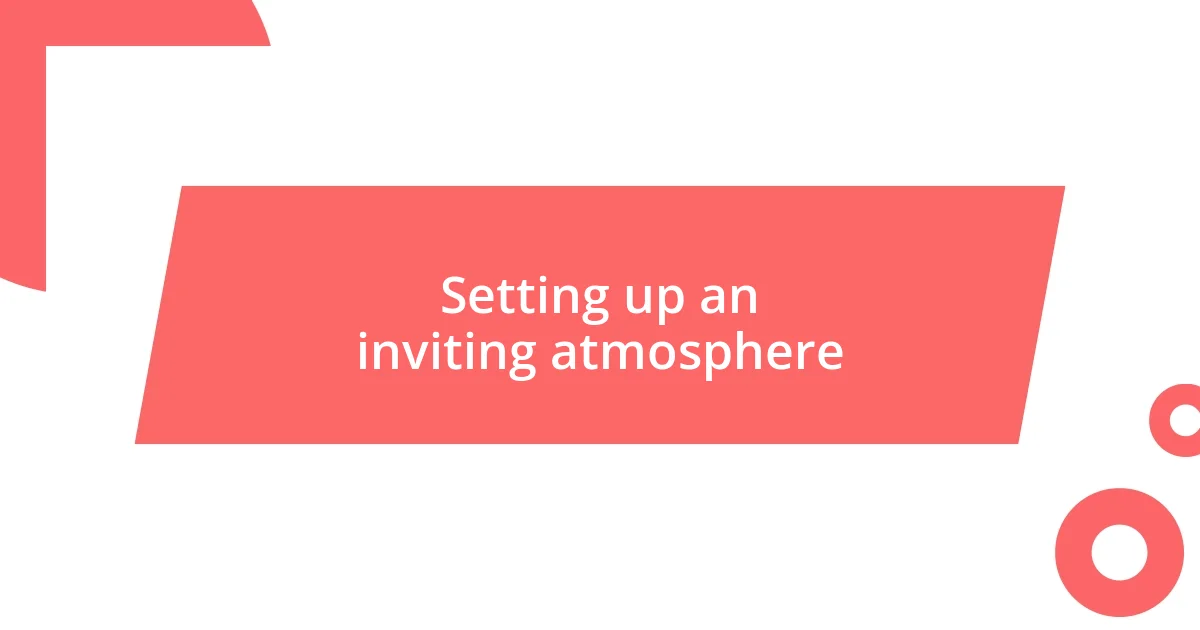
Setting up an inviting atmosphere
Creating an inviting atmosphere for trivia nights starts with the right setting. I like to dim the lights and use colorful LED strips to bring in a vibrant yet comfortable vibe. Just imagine how the room feels when those lights pulse gently to the beat of background music—it pulls everyone in and sets the mood. Have you ever noticed how the right lighting can transform a space? It’s all about making your participants feel at ease and ready to immerse themselves in the fun.
I also believe in having gaming-themed decor scattered around. A few posters of classic games or even quirky memorabilia can spark nostalgia and encourage conversations before the trivia even starts. I once placed a vintage game console on the table. It was a hit! Suddenly, everyone was sharing stories about their first gaming experiences, and I could feel the ice breaking beautifully. When you have a setup that prompts these interactions, you elevate the night beyond just trivia; you create a community.
Lastly, I make sure to have comfy seating arrangements and encourage everyone to grab drinks or snacks. These little comforts can make participants feel welcomed. I’ve hosted nights where people brought their own favorite snacks to share, and it turned into a delightful culinary exchange alongside the trivia. Doesn’t it make the atmosphere feel more homey when the laughter is mixed with the crunch of chips and the clinking of glasses? It’s those shared moments that foster connections, making each trivia night unique and memorable.

Promoting your trivia nights
To effectively promote your trivia nights, leveraging social media can be a game-changer. I always post eye-catching graphics and short teaser videos on platforms like Instagram and Twitter. One time, I created a GIF showcasing some of the wild reactions from past trivia night participants, and it went viral among my gaming friends! Doesn’t it feel exciting to think about your event creating a buzz online? You want to create FOMO (fear of missing out) that encourages everyone to join in on the fun.
In addition to social media, I recommend reaching out to local gaming communities and forums. Personally, I’ve had great success by contacting gaming cafes and clubs in my area, sharing posters, and even offering a special discount for their members. It’s incredible how a simple conversation can transform into a partnership that brings in a crowd. Could there be a better way to connect with fellow gamers than through those shared local networks?
Another strategy I love is incentivizing early registrants with small prizes or exclusive bonuses. Last summer, I offered a unique “first sign-up” gift—a custom-made pin featuring a popular gaming character. The excitement it generated was palpable! When participants feel appreciated, they’re often more eager to spread the word, making your trivia nights the talk of the town. Who wouldn’t enjoy scoring a little extra for being first to join the fun?
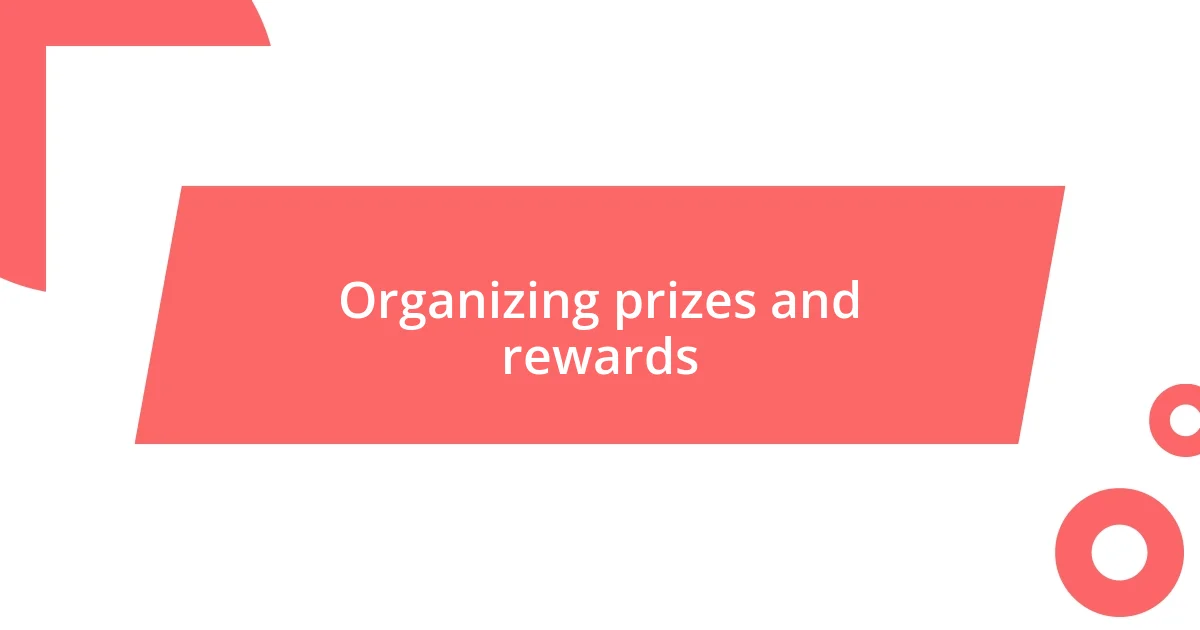
Organizing prizes and rewards
When it comes to organizing prizes and rewards for trivia nights, I truly believe that they should reflect the spirit of gaming. For instance, I once gathered a box of quirky gaming merchandise—think stickers, keychains, and even a plush of a beloved character from a classic game. The excitement in the room when someone won that plush was palpable; it was like revisiting a cherished childhood moment! Doesn’t it feel great when your prizes stir up that kind of nostalgia?
Another thing I like to do is include tiered prizes. This way, everyone has a chance to win something, regardless of their trivia prowess. I usually have a grand prize for the overall winner, like a gift card to a popular gaming store, but I also throw in smaller rewards for things like best team spirit or even the most creative wrong answer. Last time, I awarded a team who dressed up as their favorite characters with a fun little trophy I found online. Their cheers made the effort feel worth it! Don’t you think having multiple ways to win adds to the excitement?
Lastly, I always encourage participants to get involved in the prize selection. During one trivia night, I took a quick poll asking what prizes they’d like to see next time—surprisingly, the suggestions poured in! This participation not only personalized the experience but also fostered a sense of community. When people feel a part of the decision-making, don’t you think they get more invested in the event? It’s incredible how something as simple as selecting prizes can enhance the overall enjoyment!

Gathering feedback for improvement
Gathering feedback is essential for evolving my trivia nights. After each event, I make it a point to send out a quick survey. I once asked attendees to rate their favorite rounds, and the responses revealed that my “retro gaming” category was a hit! Isn’t it revealing how just one question can guide the future of your trivia themes?
I also encourage open conversations during the night. I often walk around, chatting with participants about what they enjoyed and any changes they’d like to see. One time, a player suggested incorporating live-streamed gameplay into trivia rounds, and it sparked such an engaging dialogue! This kind of direct feedback not only helps me improve but also makes attendees feel valued. Who doesn’t appreciate a host that listens?
Furthermore, I’ve learned to embrace constructive criticism. After one trivia night, a friend mentioned that the pacing felt a bit rushed. While it stung initially, I realized he was right! Adjusting the timing based on feedback improved the flow dramatically in subsequent events. It’s so crucial to welcome those insights—don’t you agree that striving for better is part of the fun?










